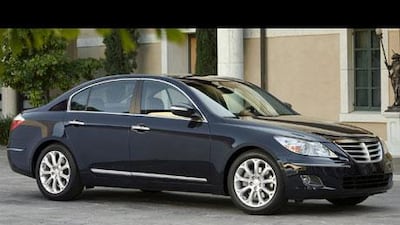When Hyundai's Genesis was introduced in 2009, I raved. Not about its luxurious interior, which was shockingly opulent for a company that just 20 minutes – oops, that's 20 years – ago, was making the Pony. I could have, I suppose, waxed lyrical about the suspension and steering, a far cry from the lowly Accents that also bear the company's logo. Or I could have praised, with great enthusiasm, a ride that was leaps and bounds ahead of anything the South Korean company had ever produced.
But, no, what I raved about was the Genesis' great V8, "Tau" if you want to follow its South Korean appellation. Four-point-six-litres of buttery smoothness, the first Hyundai V8 was, at the time, both silkier and more responsive than the equivalent Mercedes V8; a wonder since the big Hyundai cost about half as much as an E550 despite luxuriating in an almost equal amount of leather.
The V6, on the other hand, did not fare so well in my estimation. Adequate in every regard, it was much cheaper than the V8. Its price advantage compared with other V6-powered near-luxury saloons was not nearly as pronounced, it suffered a paucity of torque despite a fairly healthy 3.8L of displacement and it was more than a tad vibey when revved hard.
So, when Hyundai recently announced the introduction of its new Spec R version of the topflight Genesis, its V8 growing to five litres and infused with 429hp worth of bigger-pistoned goodness, I almost ignored that the 3.8L V6, too, was being updated with GDI injection, Hyundai's in-house nomenclature for direct injection (which sees fuel piped directly into the combustion chamber rather than just dumping it willy-nilly into the intake manifold).
It would have been a mistake, for where the Spec R's 44 horsepower jump renders an already sweet, strong motor into a sweeter, stronger-still motor, the 43hp increase to the base V6's output elevates it from the status of also-ran to contender. Like the 5.0L eight-cylinder, Hyundai's GDI system is accompanied by a compression ratio increase (since GDI injects fuel into the combustion chamber at the last possible instance, the fuel doesn't become superheated and thus is less prone to detonation) to 11.5:1 from 10.4. That alone accounts for most of the torque increase to 394Nm (up from 358), much of which occurs at low rpm.
That bulge in low-rpm pulling power accounts for much of the 3.8's newfound sophistication. No longer does the V6 need to rev its little heart out to scoot the big (1,801 kilogram) Genesis along and, since the engine no longer revs so hard, noise, vibration and harshness is much reduced. Throw in Hyundai's new made-by-ZF eight-speed automatic transmission, which has the V6 revving lower, and you have a powertrain that doesn't immediately have you wishing for a V8 upgrade. That's especially beneficial since the V6-powered Genesis is rated at an almost-diesel-like 6.9L/100km on the highway.
The same sense of relative improvement applies to the Genesis' chassis refinement. Though the V6 gets more modest improvements compared with the V8 – which gets bolstered with low-profile 19-inch sport radials, larger, hollow-beam stabiliser bars and shocks with a whopping 25 per cent increasing in damping stiffness – the improvements to the V6 are more noticeable, if only because they render the 2012 Genesis V6 less Lexus-like (which, the company baldly admitted was their target for the first-generation Lexus). A 5 Series BMW will still show the Genesis V6 its heels on a corkscrewing mountain road, but the base Hyundai is perfectly capable in all circumstances without negatively affecting the ride. Adequate seems like such a damning word, so I'll go with sufficient instead.
There's nothing merely adequate about the Genesis' interior, however. Sized roughly the same as a Mercedes E-Class or a BMW 5 Series, the Genesis has similar amounts of leather. Ditto for interior leg- and headroom and the LCD gauge set. Of course, for the lower price there is still the lack of rear controls for the dual-zone climate control air-conditioning system or the absence of adjustable damping for suspension system. One can also gripe about the lack of an all-wheel drive version, now so much a necessity for competing in the North American luxury segment, though not so much in European and other markets.
None of the complaints change the fact that the Genesis, now more than ever, offers almost 5 Series and E-Class like performance for less than the price of a Lexus ES350.
The Specs:
Base price N/A
Engine3.8L V6
Gearbox Eight-speed automatic
Power 333hp @ 6,400rpm
Torque 394Nm @ 5,100rpm
Fuel economy, combined 6.9L/100km

